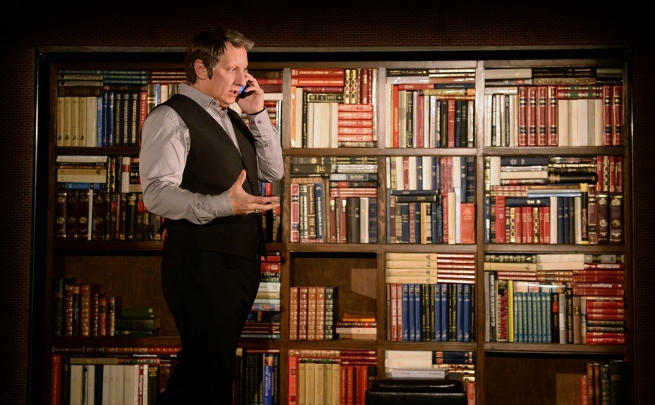
When I heard that Robert Lepage was coming back to the NAC I was immensely excited. I first saw Lepage perform when his play Blue Dragon was being shown at the NAC; I was blown away by the incredible set, lighting, technical work, and story. I was not surprised when his name was mentioned in my university theatre courses as he is a truly phenomenal Canadian director, playwright, and actor. A few years ago, another play of his – Needles and Opium – came to the NAC and although he did not act in this particular play, his mark was all over it. The set for that particular play was unforgettable and it is probably one of the best sets I have ever seen at the NAC. So when 887 was announced as part of the latest NAC English Theatre season and I saw Robert Lepage’s name attached to it I knew that I would be in for a treat.
Once again, Lepage did not disappoint.
Once again, he graced the stage in the Babs Asper Theatre with another incredible and unforgettable set. The set for this play is essentially a box that rotated between scene changes. Different sides of the box had different displays whether it was projector screen, a book shelf, or a scale model of the apartment Lepage grew up in on 887 Avenue Murray in Quebec. And sometimes this box would open up to reveal different sets within such as a kitchen, a diner, and even a garage. In addition to this, Lepage had images and film clips projected onto his set and projector screen, and even used small cameras and phones to film himself or smaller detailed aspects of his set to be projected onto the screen behind him. There was so much detail involved in both the set and its technical aspects that I must applaud the creative team at Ex Machina who put this all together.
The story primarily revolves around memory and mnemonic techniques and is presented from Lepage’s point of view. We see memory from a personal standpoint as Lepage shares aspects about his childhood in Quebec and the class struggle he and his family lived through. There is an examination of memory in relation to Lepage’s grandmother who suffered from Alzheimer’s and was losing her memory. We are presented with the notion of memory as a form of history as the bulk of the story takes place in 1960s Quebec during the time of the FLQ and the Quiet Revolution. Memory becomes important for Lepage as he learns of a CBC/Radio Canada examination of his life’s work and he begins to worry about how he and his work will be remembered after his death. And, framing this grand narrative of memory, Lepage recounts the time he struggled to remember the text of the poem Speak White by Michele Lalonde for a recitation at a public event.
The play itself is delivered in such a unique way that I believe it elevates the material we are presented with. The whole thing is a one man show where Lepage is the only actor on set, and he delivers these various anecdotes on memory in many different ways. When Lepage first appears on stage while all the house lights are still on, it is to deliver the usual “please turn off all electronic devices” speech which transitions into an examination of the amount of memory our cellphones can store, which then becomes a conversational story about his difficulty in remembering Speak White… and next thing you know he’s telling you about his childhood home in this same conversational tone as if you’re just hanging out with him at a coffee shop, and you realize the lights have dimmed and you’re already immersed in the play. Some scenes are also delivered in this more colloquial and conversational style, but others are delivered as if Lepage is reciting poetry. Some of the scenes involving more historical content are delivered almost like a lecture (not a dry, boring lecture though – the kind that makes you want to learn more). There are also scenes that Lepage actually acts out as this is, in fact, a play. In these scenes we only hear one side of the conversation as Lepage is the only one speaking and there are no other actors present, but even though we are only getting half of the story, so to speak, nothing is lost or unclear. And then there are those powerful scenes where nothing is said at all – Lepage merely moves through the space, sometimes acting in mime. But, by far the most phenomenal moment is when Lepage is finally able to present us with his recitation of Speak White. Given that the poem itself is angry and full of emotion, Lepage presents this beautifully as a kind of climax to everything that has occurred to him throughout the different levels of story (and memory) within this play. It was a truly breathtaking moment.
Although this play was about two hours with no intermission, it certainly did not feel like it. At no point was I ever bored or waiting for the play to end, and I overheard other audience members discussing the same thing. Those two hours flew by as we were all completely captivated by Lepage’s astounding piece of theatre. This has probably been the best show of the 2017-2018 English Theatre season so far and I cannot recommend it enough. I really hope that Lepage will continue to bring his plays to the NAC and I am certain he will be well remembered by Canadian audiences for years to come.


